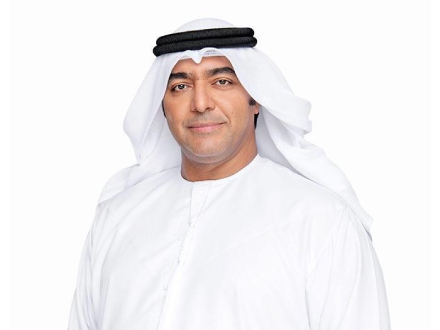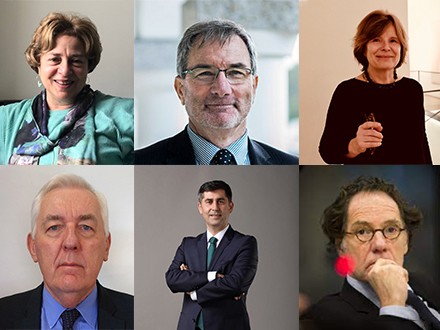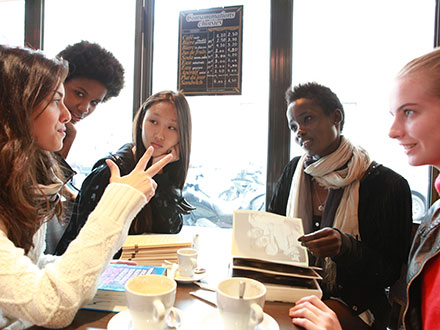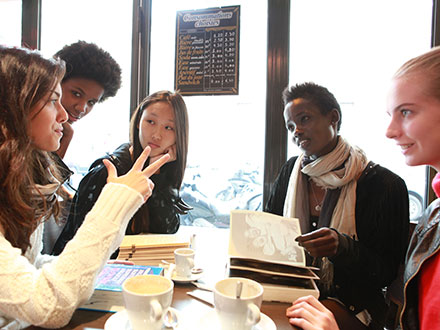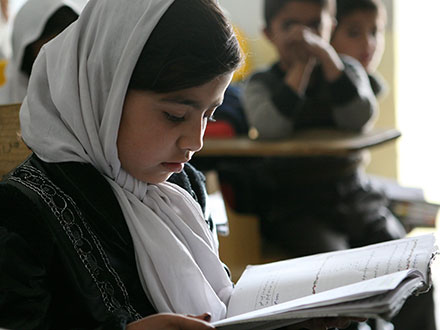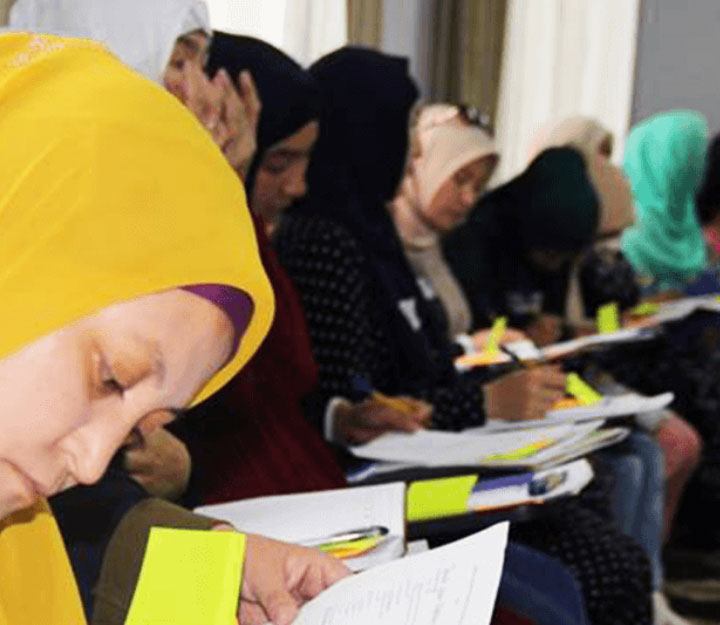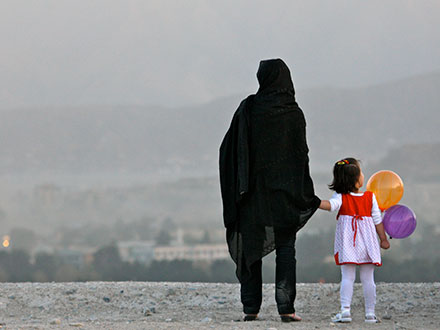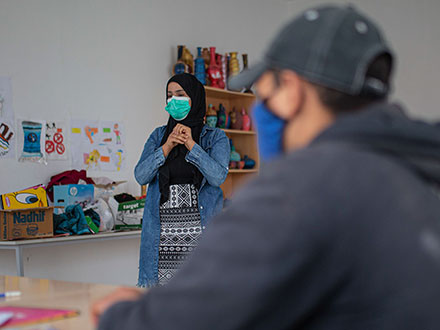Serious Games as a tool to tackle youth radicalization
by David Ludescher
This month’s article on the different projects of the STRIVE Global program will portray the Center for Social Innovations Blink 42-21 from North Macedonia and its project “Game for Change; Serious Game – Educational Tool for Strengthening Community Resilience”.
The project started its implementation in August 2019 and came to an end in October 2020.
Background
Although North Macedonia has been spared of serious terrorist attacks in recent years, there have been worrying developments. Nationalism and right-wing populism have become mainstream political movements and extremism on the basis of ethnic affiliation has led to sustained tensions and violence between different ethnic groups since the violent breakup of the former Republic of Yugoslavia. This breakup unearthed latent ethnic and religious grievances and has compounded the current way of managing the complex and multi-dimension nature of the issue today. Society has remained politically, ethnically, and religiously divided since. Adding to this a fragile social and economic situation, high unemployment of youth and lack of prospects, as well as political polarization and hate speech, the outcome constitutes a fruitful ground for violent extremism.[1]
Apart from right-wing extremism, jihadi extremism has also become a problem in North Macedonia in recent years. Over one hundred foreign fighters from Northern Macedonia have in recent years traveled to the war zones in Syria and Iraq to join extremist groups.[2] There have also been cases reported where high school teachers engaged in the promotion of radical Islam, and religious promotional materials are regularly circulated in several high schools in Skopje. Nevertheless, youth radicalization and violence are considered taboo subjects which are dealt with within the family and are rarely discussed in the public domain. Religious radicalization is mainly treated as a security issue and the social dimensions behind it are often underestimated. Communities further do not self-report cases of radicalization fearing stigmatization, police involvement, or being targeted by extremists. Media often fuel this fear of stigmatization through partial and biased reporting.[3] The solution to the problem is seen as a wide action plan that includes reforms in education and began with the adoption of the “National counter-terrorism strategy of the Republic of Macedonia for 2018-2022.[4] The government approach aims to detect and prevent radicalization and violent extremism through preventive measures and the engagement of religious institutions, media, and local institutions. As these issues are considered taboo topics, there is little space for the involvement of other actors such as social workers, school staff, or CSO representatives. These actors are furthermore untrained and unequipped to tackle this complex issue and educational reforms in the last 20 years have not achieved a significant increase in their competencies. The present model thus offers little space for action, which is why an innovative approach to countering violent extremism could be part of the solution.
Serious Games
Modern means of communication, as well as virtual worlds, enable fast connectivity and easy access to information and constitute part of the everyday life of the young generation. Violent extremist groups increasingly use the unregulated cyberspace of modern games to radicalize and recruit young people and attract supporters. In recent years, these groups have focused on developing online magazines, video clips and montages, and even video games that can be distributed through online networks. Of course, the same means can in reverse also be used to counter radicalization to violent extremism. Innovative approaches to communication, including interactive content, online cartoons, and games need to be tested and high production values and savvy branding in CVE are essential for their success.
Serious games constitute a piece of software that merges a non-entertaining, serious, purpose with the technology, design, and knowledge of video games. They help the player acquire skills and values promoted in a game. A serious game supports the training of three cognitive levels: knowledge, skills, and behavior. It engages the players in problem-solving and directly affects their engagement and motivation. As a fun way of learning, games as educational tools are very popular among students. In this sense, with their high level of attraction for the younger generation and their effectiveness, serious games offer an enormous potential to reach the youth in an innovative way.
Lunesol – Game for Change
Within this project, Blink developed the serious game “Lunesol” as an educational tool for teachers, youth workers, and youth to tackle the radicalization of youth leading to violent extremism. The story of the game was developed taking into account the local environment. It was important to include a diverse set of characters and actions into the gameplay and to provide open dialogue options that result in different outcomes. During the inception phase, the Ministry of Interior Affairs and the Ministry of Education of the national government, as well as the National Committee for Countering Violent Extremism and Counter-Terrorism, took part in several focus groups on the script and provided valuable recommendations resulting from their expertise on the topic. The result, the game “Lunesol – the Ballad of Sun and Moon”, tells the story of two races of humanoids cohabiting on a small planet. The inhabitants of the planet face a violent extremist group that threatens to disrupt peace between the two races and fights for separation of them. The main character of the game, Nyx, must save his best friend Bron from joining this group.
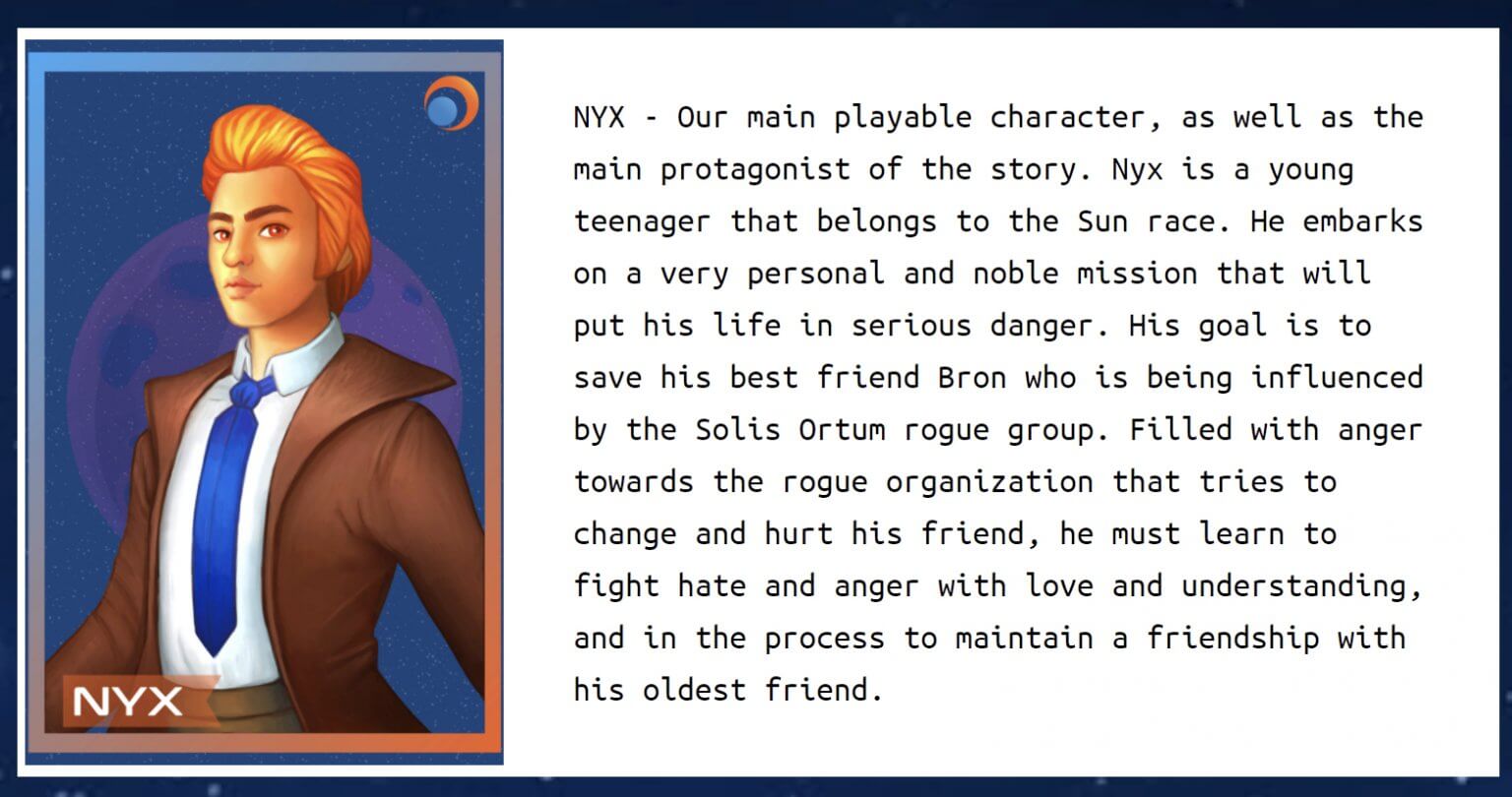
The game is a choice-driven adventure game and provides the opportunity for the players to choose different imaginary characters[5] and thus take different perspectives. Through this, the players observe everyday scenarios from different angles and how they can result in subtle changes in the individual’s behavior. Every choice affects the final outcome of the game. In this way, the players learn to understand the different aspects, motives, and threats of radicalization leading to violent extremism in a safe environment. This raises their awareness of the long-term effects of their actions and teaches them how to behave in certain situations. They also learn how and when radicalization takes place in educational settings, how to detect the signs in their own school and social surrounding, and how to react to them. At the end of the game, the players will also have gained a clearer understanding of their own authority, the policies of their educational institutions, the national laws, and how they can contribute to tackle the issue of youth radicalization and help prevent or interrupt the radicalization process.
The game serves as an educational tool by embodying different educational, psychological, and entertaining elements. All those elements are interlinked in the story and characters of the game. As this game was developed through a do no harm approach, any reference or stigmatization of a particular group was avoided, and the game does not represent already radicalized individuals and their actions. An evaluation questionnaire is also integrated into the game, which allows the assessment of the understanding of the players on the topics of violent extremism and radicalization prior and after playing the game. On the website (lunesol.eu) there is also a video tutorial on how to play the game available, as well as several explanatory videos on how to detect signs of radicalization leading to violent extremism. The promotional video further allows for a visual impression of the game.
Dissemination of the Game
After Blink 42-21 fully developed a working prototype of the game, it tested the game with two focus groups that consisted of: 1), teachers and CVE experts, and 2) students and representatives of the gaming industry. In this way, Blink 42-21 was able to gather feedback on both the content and the playability of the game, as well as if the game provides a secure environment for learning about the radicalization process. The feedback was largely positive and both groups stressed that the game succeeds in promoting a positive message. Both groups also liked the different characters one can play and that it includes a range of diverse actions and viewpoints with clear and powerful messages. Afterwards, Blink 42-21 organized three online gaming dissemination workshops where participants played the game together and where they could ask questions to representatives of Blink 42-21 and the game designer. Many of the 200 participants consisting of students, teachers, parents, youth workers, and CSO representatives pointed out that they would play the game again at home to see how different decisions would lead them to alternative endings. Furthermore, the tests showed that their knowledge of the signs of radicalization had increased sharply after having played the game. Participating teachers also stressed that the game could in the future be used as a teaching tool but that it would be necessary to increase the technical skills of teachers to do so.
As part of a visibility campaign the above-mentioned promotional video was produced in Macedonian, Albanian, and English and shared on Blink’s website and on its social media channels, together with the video tutorial and the explanatory videos. Finally, Blink 42-21 produced three webinars[6] involving relevant experts in the field and covering issues such as the use of digital games in the educational process and how games can become educational resources. A social media campaign advertising the game reached over 100’000 people in the country and so far, there are over 1’000 registered players on the web platform and mobile app combined. In the future, the project could also be adapted to include another bunch of products. The script and storyline provide the opportunity for developing alternative outcomes such as animated videos or cartoons or a theatrical dramatization of the script, which could be organized as school projects. So far, the game is available in Macedonian and Albanian but for increased reach, the game could be translated to other languages and spread regionally.
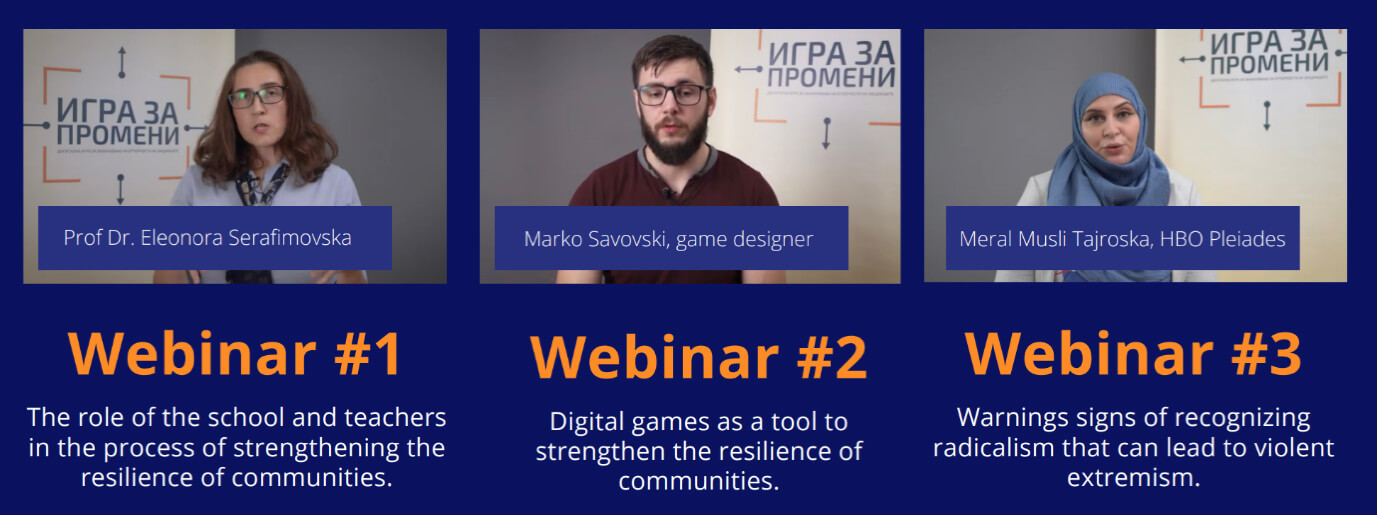
Conclusion
In conclusion, this project has been a great success and has resulted in a new and innovative approach to tackle the radicalization of youth. Lunesol tells the thrilling story of a student who tries to save his best friend from being recruited into an extremist group. The game offers different storylines depending on one’s decisions and the possibility to play a diverse set of characters who need to react to the challenge in their own way. The long-term effects of such a game are yet to be seen, but with the ongoing digitalization and the inception of the COVID-19 pandemic, this innovative approach might gain increased attention and definitely needs further exploration.
If you want to download the game to play it yourself, you can download it from the Google Play Store or directly from Lunesol’s website by signing up.[7] Thank you very much for tuning in again. We look forward to presenting you with another one of our projects next month.
References
[1] 20180417-the-former-yugoslav-republic-of-macedonia-report.pdf (europa.eu)
[2] https://bit.ly/2OBXuPy
[4] ct_national_strategy_eng_translation_sbu.pdf (vlada.mk)
[5] http://lunesol.eu/characters.php
[6] http://lunesol.eu/video.php
About Blink 42-21

The Center for Social Innovations Blink 42-21 is a non-governmental and non-profit organization that identifies social problems, develops social innovation projects, and links these projects to different individuals or groups of people. Blink is a platform that connects people dedicated to the idea that social innovation can lead to economic, educational, and social transformation and turn cultural challenges into opportunities for the well-being of society. Blink develops new ideas, programs, and models for the empowerment of citizens and institutions by promoting civic engagement and improving public policy and services, innovative education, and creative economy through technology in meeting social challenges. Find more about Blink and their different projects here.[8]
About STRIVE Global In Focus
The STRIVE Global: In Focus series will present a series of articles presenting the overarching STRIVE Global program, as well as insights and outcomes from its projects. The STRIVE Global program aims at building the capacity of state and non-state actors to effectively challenge radicalization and recruitment to terrorism while continuing to respect human rights and international law. Throughout its implementation, the program has supported 36 different civil society organizations in the Western Balkans, Central Asia, the South Caucasus, the MENA region, and Turkey.
In this series, we will present one of these organizations and its respective project each month. The series serves as a contribution to the conversation around diverse CVE solutions and pushes forward the quest for more research and innovation in the field. The authors of the articles are the STRIVE Global team and the opinions expressed in these articles are their own and not representative of Hedayah.

